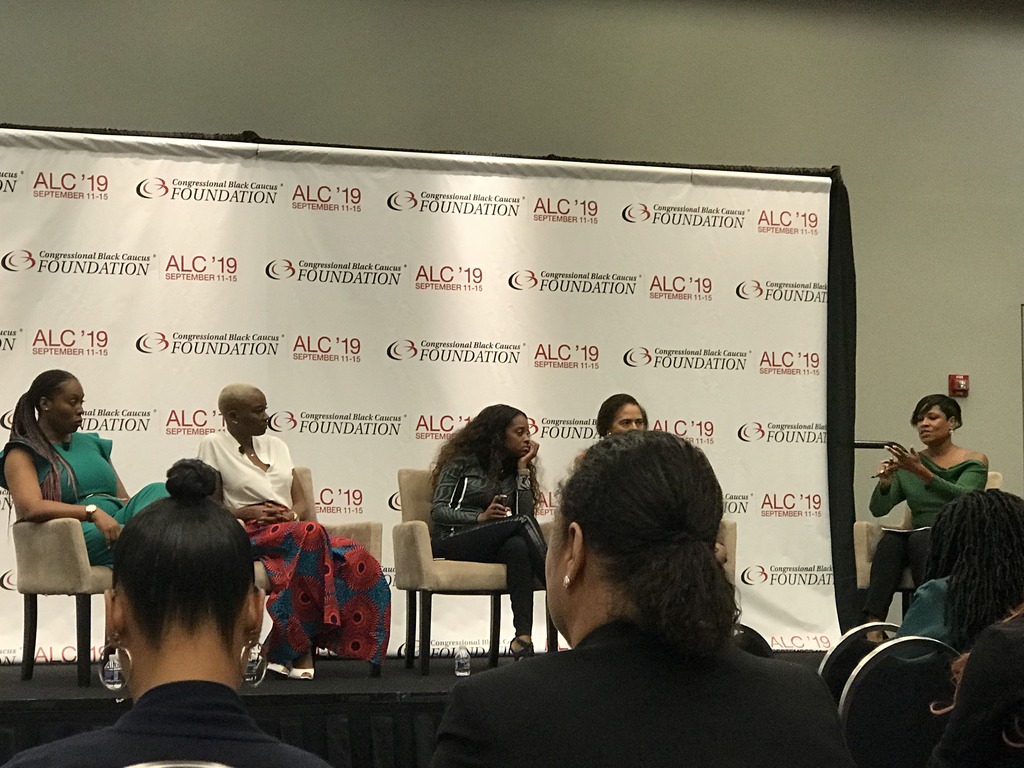[ad_1]
By Nyame-kye Kondo, Special to the AFRO
The Sojourner Truth Legacy Town Hall meeting took place Sept. 17, at the Walter E. Washington Convention Center in Northwest, D.C., as a part of the annual Congressional Black Caucus. Named after the abolitionist and freedom fighter, Sojourner Truth, the meeting is held to evoke the determination and persevering spirit of its namesake, while focusing in on the present day advancements that women of color are making in historically male dominated industries.
“This is an interesting time to be a woman of color in leadership both in the private and public sector,” said Prudential Bank vice president for Corporate Giving Shane Harris.

“A century ago women made up only twenty one percent of the U.S. workforce,” said Harris. “Today we account for nearly half of all U.S. workers. We also see more women serving on the board of Fortune 500 countries, and as presidents of more universities than ever before.”
Opening the meeting with these important statistics, Harris followed them up with the reality that Black women are still fighting for recognition, but that the advancements they have made in society are undeniable, and necessary.
“Perhaps now more than ever our country needs the diverse perspectives, as well as the passion, determination and wisdom that we bring as leaders.”
With the theme of this year’s Caucus focusing in on the “400 years later” mark of the first enslaved Africans being forced to the Americas, the Sojourner Truth Town Hall, titled “Bridging Pathways for Black Women in Politics and Leadership,” included a lineup of Black women pioneers eager to bring about socio political change in the African American community. Moderated by lawyer and social media personality, Monique Pressley, the panel kicked off with her proclaiming loud and proud to a room full of Black women,“Any good thing that has happened in the world came through a Black women! But, why do we have to fight to be heard? I want to know what is going to happen from this day forward to shift the paradigm.”
The panel featured leaders such as Tamika D. Mallory, who is known for leading the Women’s March in 2017, as well as her advocacy against gun violence; NAACP Youth and College division chair, Tiffany D. Loftin, who is helping to raise the next generation of NAACP leaders; Dr. E. Faye Williams, president of the National Congress of Black women; and equity strategist at Think Rubix Ifeoma Ike.
With each panelist providing their unique perspective based on the work that they do, and the advancements that are being made for the betterment of Black people, the conversation was broad but prioritized touching on certain topics including, but not limited to, the gender equality gap, mental health and voting rights.
Fighting for Black women’s representation in Congress for decades, Dr. Williams took the opportunity to express her jubilation for the advancements Black women have made thus far, but also expressing the fact that we must. “Tell our sisters stories as well tell our own, because if we don’t tell our stories someone else is going to tell them, and they are not going to tell the right story.”
Taking a slightly different stance, by speaking specifically to the “radical agenda” and the fact that, “we are about to lose the radical history that we already have,” Ifeoma Ike, held the audience to task by voicing her concerns on the lack of communal support that those who are considered “radicals” receive on a regular basis.
“Being radical isn’t always popular, being radical doesn’t automatically get support even within the Black community. Being radical is very intentional about transformation not reform elections,” said Ike. “During policy fights, during debates- do we want reform or do we want a revolution?”
Posing a slew of unconventional questions, and diving into the mass mentality of Black people, Ike’s commentary was an introduction for NAACP representative, Loftin, to talk about “Relational organizing and real strategic organizing in the day and age when everything is digital.”
“Folks are picking and choosing sides based on what they see rather than connecting to their own true lived experience,” Loftin said.
Using this analogy to further discuss the plight and experiences of young people who are fighting for the liberation of Black people, Lofton explain how the NAACP youth division is focusing its attention on immediate problems that young people are dealing with.
The last to speak, Mallory, brought the panel home by talking about “sustainable giving” and that, we have to sew into and trust our own communities.
“We must bet on our people,” Mallory said.
[ad_2]
Source link

